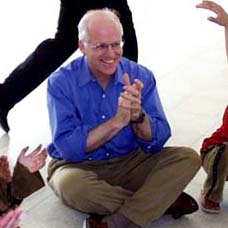1967.01.01: January 1, 1967: Headlines: Training: Project Tools: Origins of the Peace Corps/College Degree Program
Peace Corps Online:
Peace Corps News:
Peace Corps Library:
Training:
January 23, 2005: Index: PCOL Exclusive: Training :
2006.10.18: October 18, 2006: Headlines: Community Colleges: Training: Businesswire: Metropolitan State University will allow graduates from community colleges to work on their bachelorís degrees while serving in the Peace Corps :
1967.01.01: January 1, 1967: Headlines: Training: Project Tools: Origins of the Peace Corps/College Degree Program
Origins of the Peace Corps/College Degree Program

Origins of the Peace Corps/College Degree Program
Origins of the Peace Corps/College Degree Program
[An excerpt from Jack Crandall's memoir ""]
One of Al Brown's many ideas for program development was to apply the ROTC model to the preparation of Peace Corps Volunteers i.e., to combine an undergraduate degree program with training for service in The Peace Corps. In the fall of 1966 he invited representatives from Peace Corps/Washington to the campus to discuss that possibility. I was asked to sit in on that meeting and make a recommendation to Vice President Gordon Allen. That resulted in a proposal prepared under Wayne Dedman's leadership which called for combining a degree program in one of the Social Sciences with Peace Corps training. The Washington officials seemed responsive to the general idea but pointed out that Peace Corps countries needed math and science teachers not social scientists.
Early in January, 1967 Al Brown collared me at a Saturday afternoon cocktail party, informed me of the Washington reaction and told me to prepare a new proposal which would fit their needs. He concluded saying, "you don't have to rush. I don't need it until Tuesday!" That meant just one working day to put together a full-blown proposal. I used Sunday to sketch it out. On Monday Dot Bandemer, my efficient secretary, typed a couple of drafts and by evening we had produced a final version with the requisite number of copies. We were both a bit groggy and failed to notice that she had typed "Peace Crops" instead of Peace Corps on the title page. That typo turned out to be prophetic for the program did produce a rather remarkable harvest.
The officials at Peace Corps headquarters found the proposal acceptable and Brockport was asked to submit a budget as the basis of a contract. Working with The Research Foundation we hammered out a document identifying the number of staff required, suggested salaries and other costs involved in executing a fifteen-month program. In mid-January Alex Cameron, Vice President for Administrative Services; Don Nasca, Director of The Research Foundation and yours truly flew to Washington, met with the appropriate officials, negotiated adjustments which with their superior sophistication they deemed necessary and produced a mutually satisfactory budget. A few days later a contract for about three hundred fifty thousand dollars was signed by the Director of The Peace Corps, Jack Vaughn, and President Brown in the office of Jacob Javits, New York's senior U.S. Senator and in the presence of our congressman, Barber Conable.
Now, with the contract in hand, Brown's problem was that of identifying a Director for this unique Peace Corps/College Degree Program. He arranged for interviews with several persons in Washington with administrative experience in The Peace Corps. When he returned he called me (I remember that we were eating supper). I asked if he had found a Director. "Perhaps I have," he said. "I couldn't work out a satisfactory arrangement with any of the candidates in Washington. So how would you like to be the director? Harold Rakov suggests that you're the logical choice. I agree. Give it some thought. I'll see you in the morning."
I was stunned by this unexpected turn of events and somewhat overwhelmed by the prospect of conducting a program containing a critical component about which I knew virtually nothing. President Brown came to my office the next morning armed with two arguments which persuaded me to "Give it a shot." Whipping out his pen he scratched a set of numbers on a note pad to show me the impact on my salary if I went on a Federal payroll (a twenty-five percent raise). Secondly, he pointed out that I could appoint a Deputy Director who had Peace Corps experience. My affirmative response marked the beginning of the most exciting and rewarding chapter in my administrative career.
When this story was posted in October 2006, this was on the front page of PCOL:





Peace Corps Online The Independent News Forum serving Returned Peace Corps Volunteers
 | Chris Dodd's Vision for the Peace Corps
Senator Chris Dodd (RPCV Dominican Republic) spoke at the ceremony for this year's Shriver Award and elaborated on issues he raised at Ron Tschetter's hearings. Dodd plans to introduce legislation that may include: setting aside a portion of Peace Corps' budget as seed money for demonstration projects and third goal activities (after adjusting the annual budget upward to accommodate the added expense), more volunteer input into Peace Corps operations, removing medical, healthcare and tax impediments that discourage older volunteers, providing more transparency in the medical screening and appeals process, a more comprehensive health safety net for recently-returned volunteers, and authorizing volunteers to accept, under certain circumstances, private donations to support their development projects. He plans to circulate draft legislation for review to members of the Peace Corps community and welcomes RPCV comments. |
 | He served with honor
One year ago, Staff Sgt. Robert J. Paul (RPCV Kenya) carried on an ongoing dialog on this website on the military and the peace corps and his role as a member of a Civil Affairs Team in Iraq and Afghanistan. We have just received a report that Sargeant Paul has been killed by a car bomb in Kabul. Words cannot express our feeling of loss for this tremendous injury to the entire RPCV community. Most of us didn't know him personally but we knew him from his words. Our thoughts go out to his family and friends. He was one of ours and he served with honor. |
 | Chris Shays Shifts to Favor an Iraq Timetable
In a policy shift, RPCV Congressman Chris Shays, long a staunch advocate of the Bush administration's position in Iraq, is now proposing a timetable for a withdrawal of American troops. How Mr. Shays came to this change of heart is, he says, a matter of a newfound substantive belief that Iraqis need to be prodded into taking greater control of their own destiny under the countryís newly formed government. As Chairman of the House Government Reform subcommittee on national security, he plans to draft a timetable for a phased withdrawal and then push for its adoption. A conscientious objector during the Vietnam War who said that if drafted he would not serve, Chris Shays has made 14 trips to Iraq and was the first Congressman to enter the country after the war - against the wishes of the Department of Defense. |
 | Peace Corps' Screening and Medical Clearance
The purpose of Peace Corps' screening and medical clearance process is to ensure safe accommodation for applicants and minimize undue risk exposure for volunteers to allow PCVS to complete their service without compromising their entry health status. To further these goals, PCOL has obtained a copy of the Peace Corps Screening Guidelines Manual through the Freedom of Information Act (FOIA) and has posted it in the "Peace Corps Library." Applicants and Medical Professionals (especially those who have already served as volunteers) are urged to review the guidelines and leave their comments and suggestions. Then read the story of one RPCV's journey through medical screening and his suggestions for changes to the process. |
 | The Peace Corps is "fashionable" again
The LA Times says that "the Peace Corps is booming again and "It's hard to know exactly what's behind the resurgence." PCOL Comment: Since the founding of the Peace Corps 45 years ago, Americans have answered Kennedy's call: "Ask not what your country can do for you--ask what you can do for your country. My fellow citizens of the world: ask not what America will do for you, but what together we can do for the freedom of man." Over 182,000 have served. Another 200,000 have applied and been unable to serve because of lack of Congressional funding. The Peace Corps has never gone out of fashion. It's Congress that hasn't been keeping pace. |
 | PCOL readership increases 100%
Monthly readership on "Peace Corps Online" has increased in the past twelve months to 350,000 visitors - over eleven thousand every day - a 100% increase since this time last year. Thanks again, RPCVs and Friends of the Peace Corps, for making PCOL your source of information for the Peace Corps community. And thanks for supporting the Peace Corps Library and History of the Peace Corps. Stay tuned, the best is yet to come. |
 | History of the Peace Corps
PCOL is proud to announce that Phase One of the "History of the Peace Corps" is now available online. This installment includes over 5,000 pages of primary source documents from the archives of the Peace Corps including every issue of "Peace Corps News," "Peace Corps Times," "Peace Corps Volunteer," "Action Update," and every annual report of the Peace Corps to Congress since 1961. "Ask Not" is an ongoing project. Read how you can help. |
Read the stories and leave your comments.

Some postings on Peace Corps Online are provided to the individual members of this group without permission of the copyright owner for the non-profit purposes of criticism, comment, education, scholarship, and research under the "Fair Use" provisions of U.S. Government copyright laws and they may not be distributed further without permission of the copyright owner. Peace Corps Online does not vouch for the accuracy of the content of the postings, which is the sole responsibility of the copyright holder.
Story Source: Project Tools
This story has been posted in the following forums: : Headlines; Training
PCOL34817
14

















